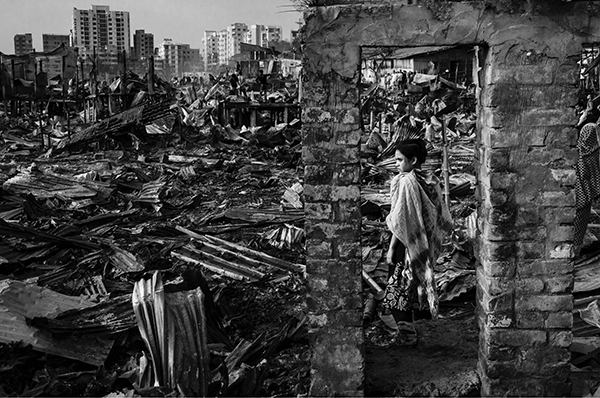
For what seems forever, television has made suffering seem stylish by recruiting people from all walks of life to endure danger and deprivation in seemingly real trials, pitting them against the elements or other contestants who are out to get them. The payoff scene at the end of the program celebrates lots of high-fives and expressions of relief as contestants board helicopters or Land Rovers to return to normal life and their often-healthier bank accounts.
This kind of made-for-TV suffering is, at its core, highly dishonest about the true nature of suffering as it has gripped the world since the sin of our first parents.
My introduction to the real suffering of those trapped in absolute poverty came on a mission trip to one of the world’s largest and most notorious dumps.
In Mexico City as well as other large cities, primarily in developing countries, whole families live in or very near the dumps, vying to be first to climb into the newly deposited truckloads of trash and scavenge enough items of value to make a meager living. The stench in the air and the scene of small children playing in heaps of garbage made me want to run, and I was extremely glad for my short visit.
Shortly after returning from this experience, I had the opportunity to hear a New Zealander, Viv Grigg, who had been serving in a church-planting mission to people living in the dumps of Manila, Philippines. This man wrote a book called Companion to the Poor about his experiences living with and sharing the love of Christ with those who would be classified as the poorest of the poor.
I use this example to illustrate that understanding suffering is not as simple as a quick visit to a dump or any other place where people are battling overwhelming odds to just survive. Those who make an impact in these settings make a commitment to be consistently present with those in suffering.
In the same way, Jesus didn’t just make a commitment when he set aside the unimaginable majesty and glory of heaven to take a quick VIP tour of earth. He took on human flesh and all that entailed to enter the primitive living conditions and authoritarian brutality of first-century A.D. Israel. The suffering he personally experienced was necessary so he could identify with every aspect of our human condition and be our Lord and Savior, fully qualified to be our Great High Priest for all eternity.
Hebrews 2:10-11 (CSB)
For in bringing many sons and daughters to glory, it was entirely appropriate that God—for whom and through whom all things exist—should make the pioneer of their salvation perfect through sufferings. For the one who sanctifies and those who are sanctified all have one Father. That is why Jesus is not ashamed to call them brothers and sisters...
The question you may ask is why Jesus needed God the Father’s additional stamp of perfection through suffering to add to the perfection of being incarnate God—the Word becoming flesh and dwelling among us? It was because Jesus was willing and called to suffer and be tempted, by being made exactly like us and undergoing all that we go through, to become our Great High Priest. He did this by laying down his morally and physically perfected body as a once-and-forever payment for our sins—past, present and future.
Hebrews 2:17-18
Therefore, he had to be like his brothers and sisters in every way, so that he could become a merciful and faithful high priest in matters pertaining to God, to make atonement for the sins of the people. For since he himself has suffered when he was tempted, he is able to help those who are tempted.
Applying an attitude of suffering to everyday life
Considering all we know of the suffering and trials of Jesus, those who followed him, and all the children of Abraham who have been made stewards of God’s promises through Christ, how are we to bring “so great a salvation” into everyday living?
An absolutely necessary place to start is to absorb and live the Beatitudes and the entirety of the Sermon on the Mount as found in chapters 5-7 of the Gospel of Matthew. In this record of the core of the moral and ethical teaching of Jesus, we find clear direction to enter and endure suffering such as telling the truth even when embarrassing or inconvenient (vs 33-37), going the extra mile (vs 38-42), and enduring insults to your person and faith (vs 43-48), and that’s just for starters.
We have been saved to serve—blessed to be a blessing.
Sometimes that involves suffering from an alienated and hostile world that deserves our godly indignation, but we are reminded, “If you are insulted for the name of Christ, you are blessed, because the Spirit of glory and of God rests upon you” (1 Peter 4:14).
Other times we are quietly called to suffer with those who are undergoing unimaginable pain or grief from the loss of a loved one, or some other deep hurt.
The point is, pain and suffering are among God’s most powerful tools—megaphones in the famous quote from C.S. Lewis—of communicating his love and care for an often-times deaf world.
What’s Next?
Why not make it your prayer this week for God to help you see and be more attuned to those who may be suffering around you? Then make it your commitment to be his presence in the midst of that suffering for his greater glory. Prayers for your journey.
Rick Krekel is a long-time member of LifeWay Church. He serves locally in missions to international students, teaches English as a second language, and serves as a cultural companion to recent immigrants and refugees. He has also traveled overseas and to Mexico on short-term service and immersion trips.